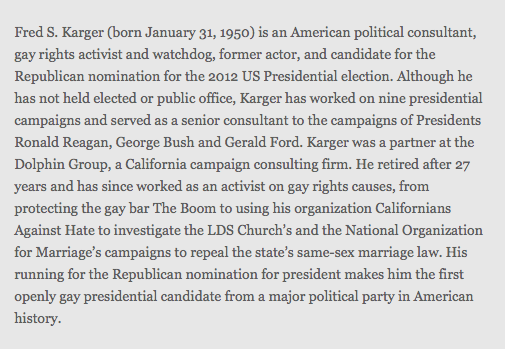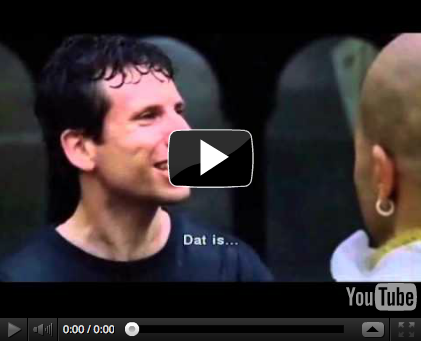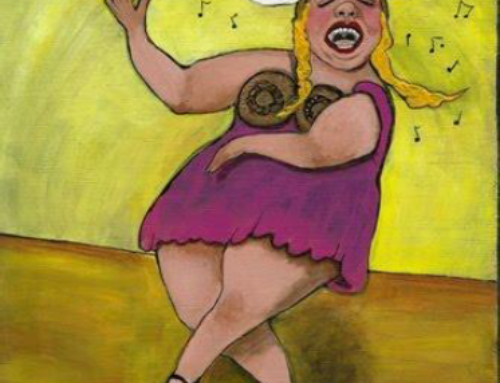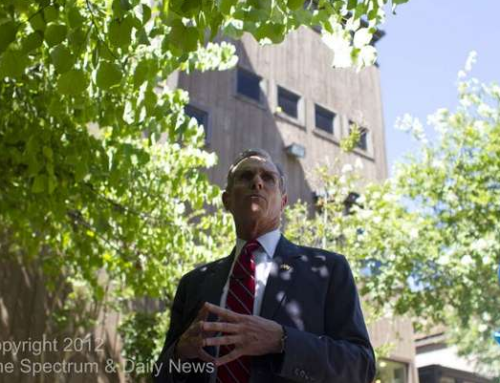For link to story, CLICK HERE
As a staff, the SheBomb writers have shown little regard for the slew of Republican hopefuls vying for the 2012 presidential nomination. I’m the first to admit that the lineup looks bleak, but hey, at least we ruled out the crazies like Per-bear and Bachmann. Mitt Romney is once again front-running the race, only to be attacked by #2 Newt for the “moderate skeletons” in his past. But things don’t look too pretty on the left, either. Obamarama is over; the promise of “hope and change” isn’t going to galvanize voters this year.
It’s great that we can express our political ideologies by dressing up as colonial revolutionaries and yelling about economic policies we don’t understand. But were the Tea Party and Occupy movements populist statements reflecting democratic dialogue, or did they serve only to undermine perfectly capable “establishment” candidates? Is there no hope for a moderate middle ground? Are we consigned to political perdition for the rest of time?
The answer is no, as long as select passionate and reasonable individuals continue to trickle through the filters of the increasingly polarized national media. Meet Fred Karger.
On Friday evening, due to an unexpected chain of events that traces back to a certain politics editor of a Michigan newspaper, I received a phone call from Fred Karger, who, despite a historic campaign, has failed to come to my attention (and probably yours too) until very recently. He’s the first openly gay man to run for president. And he’s running as a Republican. I naturally flew to Wikipedia for a quick background-check of the Illinois (New Trier alum) native:
Karger is a committed Republican, yet he is also the self-professed anti-Romney candidate. So, what would he do if an Obama v. Romney election presented itself this fall? Well, he voted for Nader in the last two presidential elections. I mentioned conscientious non-voting, which he seemed to think was a valid – though not ideal – option for educated voters. Explaining that “voting is personal,” he elaborated that one will never agree with a candidate 100%, but we nevertheless elect the best one available. In short, he has immense confidence in the political decisions of the average American voter.
I certainly don’t. I feel that, in general, Americans are uninformed and concern themselves too much with social issues, avoiding more pressing ones such as foreign policy and economic concerns. Politicians, displaying effective advertising techniques, respond to that. (Well, they should… shouldn’t they?) Karger, however, believes that Americans don’t limit themselves to one issue, instead voting according to the “whole package” of the candidate.
Or at least they did when they did when they elected Ronald Reagan. (Karger’s firm did major consulting work for Reagan’s presidential campaign.) He explained the former president was popular because “[Reagan] knew where he stood, he didn’t vacillate, he didn’t flip-flop.” Reagan saved the economy by sheer optimism, even if the fiscal policy turned out to be not quite right. Consistency, according to Karger, is far more important than winning any individual block voters.
Could I overlook Reagan’s tenacious conservatism for his consistency and charisma? As far as LGBT rights during Reagan years go, I point to the award winning drama “Angels in America.” Subtitled “a gay fantasia on national themes,” the story focuses on the AIDS epidemic that peaked during the height of the Reagan years, and the abandonment and resentment felt by many in the gay community. The “I hate America” speech beginning at 3:15 largely reflects the tone of the play.
Even in spite of the political climate of the Reagan years, I am inclined to agree with Karger. Political agendas change, but an individual’s quality of character does not. Consistency supersedes policy. 16 years ago, when running for Illinois state senate, Obama came out as one of the first influential public figures to fully endorse marriage equality. Now, however, his view on gay marriage is “evolving.” Karger, in fact, wrote a Huffington Post article in response, calling on Obama to “evolve already!” He noted that our president is possibly the only major political figure to publicly alter his attitude toward marriage equality in the wrong direction. Even though Obama clearly still supports gay marriage, he’s bowed under political pressure and given up that conviction.
We can yell across the aisle about abortion and the 2nd Amendment all we want, but on Election Day, we vote for charm. That’s what you get in the land of Hollywood, baby. (The issues are too fuzzy for most of us to understand, anyways.) That’s why Obama rode the “hope and change” wave to the Oval Office in 2008. Maybe Reagan was “wrong” in certain (liberal-identified) respects, but at least he was optimistic. And consistent. And so is Fred, with whom the typical SheBomb reader will probably agree socially. He wants to see equal marriage rights as the “law of the land.” He supports a woman’s decision to choose regarding her reproductive rights. He believes in the legalization and regulation of marijuana (without the batshit-idealogical tradeoff you get with Ron Paul).
Great! What next? Is Fred Karger going to appear next to Obama on the ballot come November? No, but that doesn’t mean he isn’t making an impact.
During our phone call, I detailed my experience with LGBT leadership before coming to college. After coming out my junior year, I jumpstarted a Gay-Straight Alliance at my high school. As the seemingly (and maybe actually) only “out” individual in a school of approximately 1600, I felt that the hidden LGBT community needed a haven to discuss sexuality safely and openly. It was the hardest thing I’ve ever done. I knew that in the scheme of things I was doing a good thing, but it was tremendously emotionally draining.
A sizable amount of guys stopped speaking to me after I made such a public declaration of my pro-gayness. Since leaving high school, I’ve been conflicted as to whether or not I regret it. It was like I was limited by this stupid sexual label; it felt that people saw me as just gay. And that I had put myself in that position. Having garnered media attention for being the first openly gay candidate, I asked Fred if he had any of the same feelings and reservations about the attention to his sexuality. He first reminded me that whatever the price I paid for being out in high school, it was better than living in the closet. And that the lives of other closeted kids might just be a little better because of the group I created.
So, as it turns out, I’ve been asking myself the wrong questions. It’s not a matter of how difficult it was for me then, it’s a matter of how selfless I want to be now. And Fred is certainly being selfless. He says of his campaign that his “goal in running” is “to inspire the next generation through his candidacy.” Well, I’m certainly inspired; he’s effecting a change, because there always has to be a first. There was once a first African-American to attend the University of Mississippi. There was once a first woman to join the Navy. And now there’s the first openly gay person to run for president. He mentioned that the notoriously conservative Dick Cheney has a gay daughter he unconditionally loves.
Change isn’t realized by TV commercials featuring Hilary Duff telling us not to use the word gay disparagingly. That’s great, really. But attitudes are changed by individuals – by real, respected people who come out and change society’s schema of what it means to be gay.
What I noticed at the end of my conversation with Fred is that I want to like him; it’s just this inexplicable bias I have. Is it because he’s gay? Because his social views align with mine? Because we’ve partied at the same gay club in Ann Arbor? No, it’s because he’s personable, charming, and consistent. And regardless of his political party, he’s doing a good thing for the country, so the rough edges don’t matter so much. Just like he said.
I’m not too interested in politics. I watched parts of some Republican debates, but they just made me nauseous. The way I see it, we won’t remember the Republican contenders in ten years, so why even pay attention now? The offensive comments Michelle Bachmann made won’t be relevant after this short-run political cycle. That kind of person doesn’t have a legacy. But if gay rights – not as a political agenda, but as a concern for human decency – can be advanced just a little because this man, I consider his campaign success. Even if he’s just quietly upsetting the status quo in the Republican party, he represents a brighter future for a better GOP and an elevated national discourse. But most importantly, he inspires hope of a brighter future for the next generation of leaders, gay or not.







